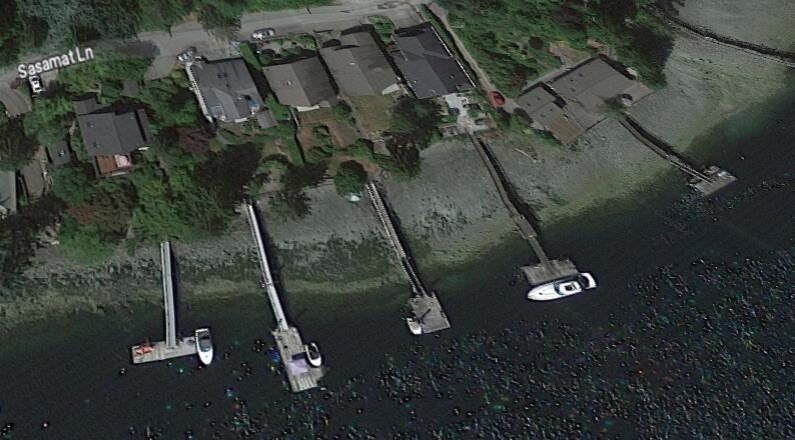Owners of two adjoining properties on the shores of North Vancouver’s Indian Arm will continue to share a waterfront dock that both families have used for 50 years, a B.C. Supreme Court judge has ruled.
Justice Michael Brundrett weighed in on the issue after a dispute over the dock made waves between the long-time neighbours.
According to a written court ruling, the watery feud broke out after decades of peaceful co-existence in June 2021. That’s when the senior members of the Ford family – whose property the dock was in front of – told the adult children of the Dooling family next door they could no longer use the dock, which had been built by senior members of both families many years earlier.
The adult children of the Dooling family took issue with that and asked a judge to declare their continued interest in the dock and ability to access it.
In a decision recently handed down in B.C. Supreme Court, Brundrett agreed with them.
According to the judge’s decision, the dock was originally built by three families – headed by three friends and co-workers at a local auto dealership – in the 1960s. The families had bought water-access waterfront lots next to each other on what is now Sasamat Lane.
When the dock was built over 50 years ago, the three families decided to build it off the Fords’ property because it provided the best moorage location, with the Fords applying for and being granted a water lease for $25 in 1968.
The dock was used by all three families until one of them sold his property in the 1980s.
After that, the dock-sharing between the two remaining families continued, and the members of those families “worked, recreated and socialized together” at the cabins they built on the lots, the judge noted.
The two families continued to share expenses for the dock along with contributing labour for upkeep.
According to the judge’s decision, the arrangements about the dock were mostly informal ones between Robert Ford and Leo Dooling, the patriarchs of the two families, who had been friends for many years.
In 2005, there was a discussion between the two men about what would happen if the Fords sold their property. Leo Dooling consulting a lawyer with the idea that a written agreement should be put in place. But Ford told him not to waste his money.
Ford later testified in court that he understood their informal agreement would apply to his friend and his wife but would not necessarily carry over to later generations.
In the intervening years, meanwhile, the port authority had placed a moratorium on new dock construction, then replaced that with tighter regulations that restricted how many docks would be approved and how close those docks could be to each other, the judge noted.
Following the deaths of Leo Dooling in 2019 and his wife in 2020, the couple’s adult daughters inherited the property and continued to use the dock.
But in June of 2021, Robert Ford’s wife Fay told one of the Dooling daughters that they could no longer use the dock.
Informal dock-sharing agreement holds, judge decides
In court, the Fords testified they were worried about potential liability, the judge wrote. In addition, Robert Ford was concerned about a shared dock diminishing his property value after a real estate agent told him a shared dock would lower the value of his home by about $200,000 compared to a home with a private dock.
The key issue was whether the informal dock sharing agreement between the two families was meant to end with the deaths of the senior family members or carry on to their successors, wrote the judge.
The justice wrote that while the Fords appeared to believe the agreement would end with the senior Doolings’ deaths, that wasn’t what the Dooling family understood and there had never been any explicit words to that effect.
On the contrary, through their conduct over many years, the judge found there had been “assurances and representations that the Dooling family could access and use the dock.”
The families’ original agreement to share the dock and subsequent adoption of new port authority regulations meant the very existence of the dock in its current location limits the ability of the neighbours to build one of their own, the judge noted.
After co-operating for over 50 years, the judge found the reason the Fords had tried to shut out the Doolings was more likely over concerns about real estate values than any legitimate end to their right to access the dock.
Brundrett ruled that the neighbouring Doolings be given shared rights to the Fords’ existing water licence and dock and an easement to provide continued access.



